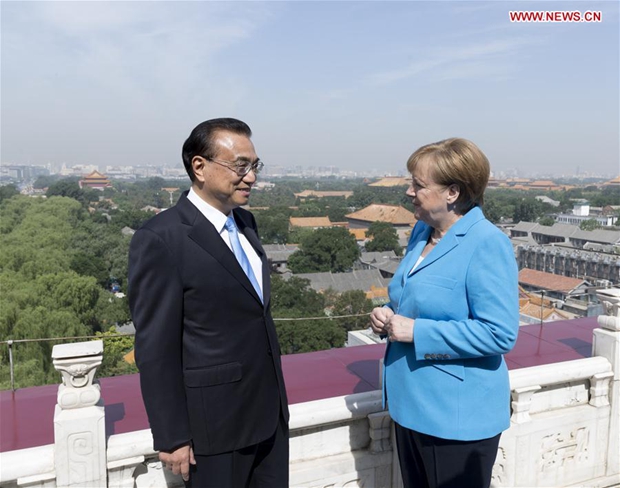For Berlin and Beijing, it's simple euros and yuan
- By George N. Tzogopoulos
 0 Comment(s)
0 Comment(s) Print
Print E-mail China.org.cn, May 29, 2018
E-mail China.org.cn, May 29, 2018

Following the formation of Germany's new government, again composed of the conservative Christian Democratic Union party and the center-left Social Democratic Party, Chancellor Angela Merkel is now engaged in important foreign policy initiatives. Her visit to China from Thursday to Friday last week highlights the attention she intends to pay to Sino-German relations – and economic ties in particular – during her fourth term.
The website of the Germany Embassy in China demonstrates the nature of the countries' bilateral trade partnership. In 2017, trade volume reached 186.6 billion euros (US$230 billion), making China the biggest trading partner of Germany. Specifically, China was the third biggest destination for German goods, worth 86.2 billion euros in total. It also was the most important supplier of goods to Germany, exporting products worth 100.5 billion euros.
A significant upward tendency is evident. Trade volume was 16.4 billion euros lower in 2016. On the whole, "China, in particular, has become increasingly important as a trading partner for Germany" since 2000, according to a publication by Germany's Federal Ministry for Economic Affairs and Energy from August 2017.
The ministry's publication continued: "Between 2000 (1.6 percent) and 2016 (6.3 percent), German exports to China nearly quadrupled. This means that in 2016 China was the second most important market for German exporters outside Europe, behind the USA (8.9 percent). China's share of German imports also rose significantly in the same period: from 3.5 percent (2000) to 9.9 percent (2016)."
The Sino-German relationship is described by the Chinese government as an "all round strategic partnership," meaning that the two sides are continuously looking for additional fields of cooperation.
Merkel is currently attempting to secure deeper access to the Chinese market for her country's companies, and create better conditions for them to invest and operate in. With China's "reform and opening-up" policy ongoing, her will and determination find Chinese authorities in accord.
Media outlets – including German ones – are regularly criticizing China for delaying the removal of restrictions, despite some progress already made. But in a letter published on May 11, 2018, the European Union Chamber of Commerce in China expressed its encouragement "by recent, public reform pronouncements, such as the State Council's documents No. 5 and No. 39." Moreover, it said it believes that "Further rounds of reforms will happen before the end of 2018," and sees examples of already-realized reforms "in the financial services sector, but also the industrial sector." Some German industries share similar positions to that of the EU Chamber of Commerce.
As far as China's presence in Europe is concerned, Merkel is the pioneer of a new, critical European approach aimed at monitoring Chinese investments in the context of the country's Belt and Road Initiative. In essence, the EU is designing protectionist measures to prevent investment in key infrastructure works by Chinese state-owned enterprises as well as takeovers of European companies producing sensitive technologies. Although the European legal framework is expected to be strengthened, China's advantage remains its ability to offer liquidity and create jobs in desperate nations suffering from unemployment.
Despite their differences and disagreements, China and Germany have much more to gain by looking for common solutions. Both President Xi and Chancellor Merkel are in favor of dialogue and negotiations in spite of the toughness of some themes. This philosophy is making it possible to have more bilateral synergies, as well as multilateral ones under the EU framework.
George N. Tzogopoulos is a columnist with China.org.cn. For more information please visit:
http://www.china.org.cn/opinion/GeorgeNTzogopoulos.htm
Opinion articles reflect the views of their authors, not necessarily those of China.org.cn.






Go to Forum >>0 Comment(s)